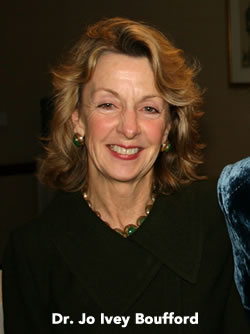By Jacob M. Appel MD
 "I've never been a big activist from the outside, but from the inside," says Dr. Jo Ivey Boufford, President of the New York Academy of Medicine. "I liked clinical practice a lot and I really enjoyed working with the patients," she explains, noting that she practiced pediatrics for fifteen years, "but I felt I would have more impact entering the policy arena or the management arena, working on institutional change or policy change." Her groundbreaking career witnessed her becoming the first woman to run New York City's Health and Hospitals Corporation in 1985; later, she served as Deputy Assistant Secretary for Health in the Department of Health and Human Services under President Clinton and as dean of NYU's Robert F. Wagner Graduate School of Public Service. Since 2007, at the helm of the 169-year-old Academy, one of the nation's leading healthcare advocacy organizations, she has brought this experience to bear on systemic factors affecting the wellbeing of New Yorkers.
"I've never been a big activist from the outside, but from the inside," says Dr. Jo Ivey Boufford, President of the New York Academy of Medicine. "I liked clinical practice a lot and I really enjoyed working with the patients," she explains, noting that she practiced pediatrics for fifteen years, "but I felt I would have more impact entering the policy arena or the management arena, working on institutional change or policy change." Her groundbreaking career witnessed her becoming the first woman to run New York City's Health and Hospitals Corporation in 1985; later, she served as Deputy Assistant Secretary for Health in the Department of Health and Human Services under President Clinton and as dean of NYU's Robert F. Wagner Graduate School of Public Service. Since 2007, at the helm of the 169-year-old Academy, one of the nation's leading healthcare advocacy organizations, she has brought this experience to bear on systemic factors affecting the wellbeing of New Yorkers.
In the nineteenth century, the organization addressed many of the urban public health crises that we now associate with the developing world: sewage disposal, nutritional deficiencies of childhood, infectious disease prevention. More recently, and especially under Boufford's leadership, the Academy has expanded its approach. "We're working very far upstream in terms of realizing that the way in which people can prevent illness is by changing communities....It's fine and dandy to say eat well, to say exercise...but if you live in a community that doesn't have those resources available, we end up with 'victim blaming'" which is precisely what advocates strive to avoid. While many other healthcare nonprofits focus on more traditional notions of medicine such as clinical care and access, the Academy has been tackling broader determinants of health--education, housing, transportation.
Two major initiatives currently underway at the Academy focus on healthy aging and healthcare disparities. The former began as a pilot program in East Harlem, with the Academy asking elderly community members what they saw as challenges. Among those items at the top of the list was an opportunity to swim at public pools, which led to the establishment of senior swimming hours--first in Harlem and later throughout the city. A similar initiative on the Upper West Side resulted in earlier hours at the Apple Store, so seniors could learn how to use computers, and shopping assistance at Fairway Market. The goal is to make New York an "aging friendly" city. And while the Academy's work is focused on New York, Boufford observes that the city's size and prominence mean that the world is often watching, and initiatives spearheaded in New York have the potential to spread well beyond its borders.
Boufford is herself a product of the South. She was born in North Carolina and lived in Atlanta, Georgia, until age twelve, when her family relocated to New York City, then later moved again to Michigan. As a result, she attended large public schools, but also spent a year at the Chapin School in Manhattan, which gave her "a taste for women's education." That led her to Wellesley, then the University of Michigan, from which she earned both a BA in psychology and a medical degree. She was one of 25 female students in a class of 220. As a female student, she did not feel she faced overt discrimination, but rather "there wasn't a differentiation to recognize your presence"; for instance, at convocation, the dean welcomed the students as "gentlemen." Over time, especially during her early policy career, she grew used "to being the only woman in the room." Among her most significant mentors and roll models were two non-physicians: Ruby Hearn, a senior vice president at the Robert Wood Johnson Foundation, and Margaret Mahoney, a former president of the Commonwealth Foundation, who was "one of the first women in national philanthropy" and "someone who was clearly positive about women being engaged." She also admired former Montefiore President Martin Cherkasky, an early employer, who was among the first hospital administrators to "put his head above the parapet of his own institution" to emphasis the overall health of the city's residents.
Although Boufford's path has been anything but traditional, she urges those interested in healthcare policy or management to earn their medical degrees. "Medicine is a fabulous field to go into because it offers you a tremendous amount of flexibility," she says "You have your tickets in term of whatever you want to do." #

Leave a comment